IMDEA Networks

Archives: Events
A Control Theoretic Approach to Distributed Optimal Configuration of 802.11 WLANs
The optimal configuration of the contention parameters of a WLAN depends on the network conditions in terms of number of stations and the traffic they generate. Following this observation, a considerable effort in the literature has been devoted to the design of distributed algorithms that optimally configure the WLAN parameters based on current conditions. In this work we propose a novel algorithm that, in contrast to previous proposals which are mostly based on heuristics, is sustained by mathematical foundations from multivariable control theory. A key advantage of the algorithm over existing approaches is that it is compliant with the 802.11 standard and can be implemented with current wireless cards without introducing any changes into the hardware or firmware. We study the performance of our proposal by means of theoretical analysis, simulations and a real implementation. Results show that the algorithm substantially outperforms previous approaches in terms of throughput and delay.
Read more arrow_right_altPh.D. Thesis Defence: Dynamic and Location-Aware Server Discovery Using a Fair Distributed Hash Table
Next Monday Rubén Cuevas shall defend his Ph.D. Thesis entitled: “Dynamic and Location-Aware Server Discovery Using a Fair Distributed Hash Table”. His supervisor is Dr. Carmen Guerrero, Associate Professor, University Carlos III of Madrid; Researcher, NETCOM Research Group
Read more arrow_right_altWhen the network follows the mobile: extensions to Proxy Mobile IPv6
Users' demands for Internet connectivity anytime anywhere are no longer a future requirement, but a reality that operators face today. The current trend in hand-held devices, equipped with multiple access technologies, and accessing IP data services triggered the need for mobility support managed by the IP layer. However, the complexity of protocols such as Mobile IP complicated the deployment of solutions in real products. Lately, there is a new trend toward solutions that enable the mobility of IP devices with a local domain with only the support from the network. Proxy Mobile IPv6 is the solution standardized by the IETF that follows this "novel" approach.
Read more arrow_right_altP2P Content Distribution
Multimedia content delivery is projected to be the biggest bandwidth consumer of the future Internet. For many years, the mechanism for content delivery envisioned by the networking community is network multicast.
Multicasting emulates traditional TV broadcasting; it is designed to be network efficient. But it falls short in at least two aspects: (a) it does not maximize throughput for content delivery; (b) like TV broadcasting, it does not provide on-demand access (i.e. Video-on-Demand).
Read more arrow_right_altTowards the integration of heterogeneous sensor/actuator networks into context-aware systems
Embedded sensor systems are well suited to provide context data, i.e. any information which allows determining the context of entities (e.g. a user's location, an object's environmental parameters, or the number of people in a room). The additional integration of actuators allows interaction with the real world, e.g. control of heating, ventilation, or lighting. However, the big gap between the heterogeneous set of devices providing sensing and/or actuation needs to be bridged to enable smart context-aware applications. Special consideration hereby needs to be given to the efficient use of the available energy budget and the support for device heterogeneity. In this talk, means towards energy-efficient data transfer by applying header and payload compression for Wireless Sensor and Actuator Networks (WSAN) are presented, as well as our approach towards the seamless integration of WSAN nodes through using semantic self-descriptions and means towards unifying the access to node resources.
Read more arrow_right_alt
Impact of Prefix Hijacking on Payments of Providers
Whereas prefix hijacking is usually examined from security perspectives, this paper looks at it from a novel economic angle. Our study stems from an observation that a transit AS (Autonomous System) has a financial interest in attracting extra traffic to the links with its customers. Based on real data about the actual hijacking incident in the Internet, we conduct simulations in the real AS-level Internet topology with synthetic demands for the hijacked traffic. Then, we measure traffic on all inter-AS links and compute the payments of all providers. The analysis of our results from technical, business, and legal viewpoints suggests that hijacking-based traffic attraction is a viable strategy that can create a fertile ground for tussles between providers. In particular, giant top-tier providers appear to have the strongest financial incentives to hijack popular prefixes and then deliver the intercepted traffic to the proper destinations. We also discuss directions for future research in the area of hijacking-based traffic attraction.
Read more arrow_right_altWHY I AM A SCIENTIST - Researchers' Night, Madrid 2010 - Creativity for progress in Europe
In the context of "Researchers' Night, Madrid 2010 - Creativity for progress in Europe", the IMDEA initiative will take part in the “Why I am a scientist” event, through the participation of directors from each one of the eight member institutes.
Why I am a scientist
Organiser: Madrid Institute for Advanced Studies (IMDEA)
Hour: From 18:00 p.m to 19:30 p.m
Read more arrow_right_altI-seismograph: Observing and Measuring Internet Earthquakes
Disruptive events such as large-scale power outages, undersea cable cuts, or Internet worms could cause the Internet to deviate from its normal state of operation. This deviation from normalcy is what we call the impact on the Internet, which we also refer to as an "Internet earthquake."
Read more arrow_right_alt
Technology Transfer Symposium Institute IMDEA Networks – AETIC – UC3M
Event program:
09:00 - 09:30 Welcome and registration
09:30 - 09:50 Opening of the Symposium
D. Arturo Azcorra, Director General, CDTI
D. Francisco Marín, President of Area of Activities for Technological Innovation, AETIC
D. Albert Banchs, Deputy Director, Institute IMDEA Networks
D. Carlos Balaguer, Vice-Rector of Research, UC3M
09:50 - 10:15 Presentations
Presentation of Institute IMDEA Networks, D. Albert Banchs (  Download presentation 2006 Kb )
Download presentation 2006 Kb )
Presentation of the departament for I+D+i of AETIC, D. Juan Gascón, Director for Digital Content & R&D, AETIC
(  Download presentation 2256 Kb )
Download presentation 2256 Kb )
10:15 - 11:00 Energy Efficiency
Energy-efficient Networking at Institute IMDEA Networks
D. Antonio Fernández Anta, Senior Researcher, Institute IMDEA Networks (  Download presentation 160 Kb )
Download presentation 160 Kb )
TELVENT Energía
D. Francisco Romero, Director for Business Development (  Download presentation 1.757 Kb )
Download presentation 1.757 Kb )
INDRA
Dña. Marta Arias, General Manager for Energy Efficiency (  Download presentation 538 Kb )
Download presentation 538 Kb )
iNEXT and An Energy Driven Architecture for Modelling Energy Consumption in Wireless Sensor Networks
The talk consists of two parts. The first part will present an overview on the current research activities of iNEXT (Centre for Innovation in IT applications and Services) at the University of Technology, Sydney. This includes a brief description of our Sensor Grid for Assistive Healthcare project.
Read more arrow_right_alt

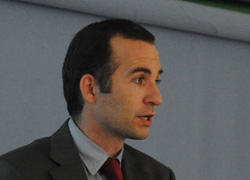
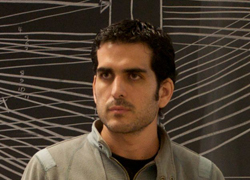
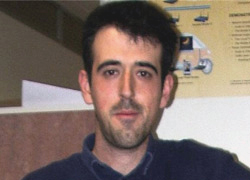
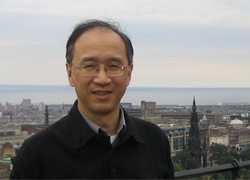


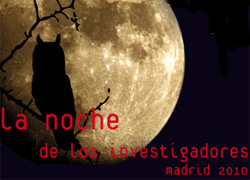
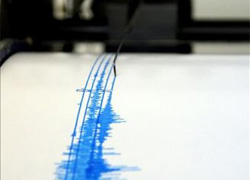
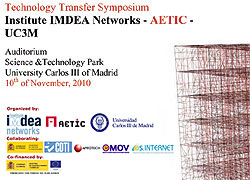
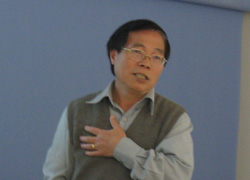
Recent Comments